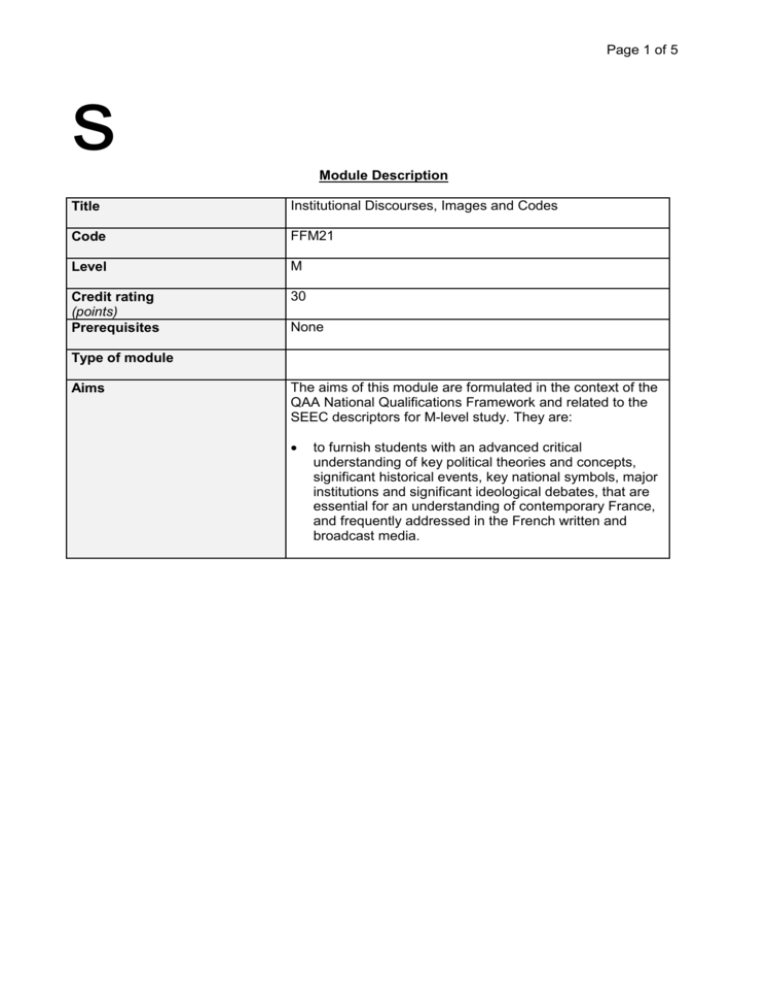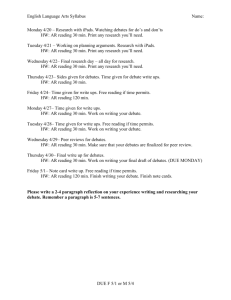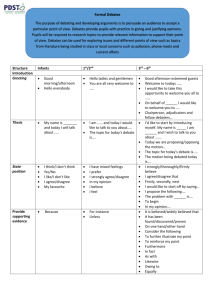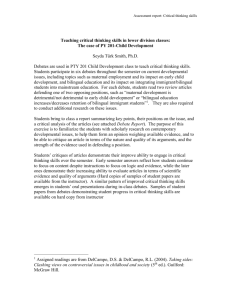Institutional Discourses, Images and Codes
advertisement

Page 1 of 5 s Module Description Title Institutional Discourses, Images and Codes Code FFM21 Level M Credit rating (points) Prerequisites 30 None Type of module Aims The aims of this module are formulated in the context of the QAA National Qualifications Framework and related to the SEEC descriptors for M-level study. They are: to furnish students with an advanced critical understanding of key political theories and concepts, significant historical events, key national symbols, major institutions and significant ideological debates, that are essential for an understanding of contemporary France, and frequently addressed in the French written and broadcast media. Page 2 of 5 Learning outcome/objectives In relation to the National Qualifications Framework and the SEEC criteria for M level study, by the end of the module students will be able to: 1. analyse significant currents of political thought in France since the French Revolution 2. explain key historical events and ideological debates about the nature of post-Revolution France, and their significance in relation to social and cultural patterns in contemporary France. 3. assess the meanings and function of key public symbols of France and the French Republic 4. carry out critical analyses of media documents dealing with the above themes 5. know how to analyse and assess the historical, social or political relevance to its context of a document dealing with political ideas, and use a range of research methods in the area of French political thought to critically investigate key writings on French democracy and political theory Page 3 of 5 Content (for contact time and non-contact time) Analysis of French political and historical discourse will be based on a selection of texts drawn from: written constitutions and the Declaration of Human Rights texts by theorists such as Rousseau, Montesquieu, de Tocqueville, Constant speeches by major political figures such as de Gaulle, Pétain, Ferry editorials and other media articles films dealing with themes such as those listed below . Indicative list of themes: the Republic and Republicanism the French revolution and the struggle for the Republic the meaning and significance of terms such as democracy, freedom, citizenship, sovereignty of the people, liberalism the French concept of the State, centralisation Religion and the State in France: the Catholic Church, laïcité, Islam Iconography of the Republic (Marianne, public monuments, representations of the Republic in film) Ideas, political ideals and public debate in the media Contemporary debate, e.g. laïcité versus cultural diversity, national identity, the Vth Republic. Research methods used in the analysis and interpretation of documents dealing with these themes will be explored. The following research process will be considered and put into practice in the research paper: how to select a document and formulate an objective to do with the relationship between the document and its context. Monitored close reading and interpretation, from initial close summaries of key ideas through to the formulation of the research question. 2. focussing on methods for accurate contextualisation of the document within its wider historical, social or political context 3. formulating conclusions containing an appropriate balance between critical analysis and contextualising synthesis. Page 4 of 5 Teaching and learning strategies Reading of primary texts, debate, individual analysis of texts, short lectures on political theory, small-group workshop analysis of key documents, group analyses of visual images, group discussion of relevant films and media documents. Theoretical background/ preparation for the research project will include individual guided reading; and guided practice in class in close reading and interpretation of texts, from initial close summaries of key ideas in a document through to the formulation and investigation of a research question. Learning support (include full details of up to 8 titles) Agulhon, M. 1992 Marianne. Les visages de la République. Paris, Gallimard Alexander Martin S. ( ed), 1999, French History since Napoleon, London, Arnold Baubérot J., 1990, La laïcité, quel héritage de 1789 à nos jours?, Paris, Labor et fides. Barzun, J., & Graff, H.F, 91977) The Modern Researcher, NY: Harcourt, Brace Jovanovich Documents d'Etudes, droits constitutionnels et institutions politiques, La Documentation française, no 1.04 édition 1994, no 1.178 édition 1995, Paris, La Documentation française Furet F. et Ozouf M., 1992, La République, Paris, Gallimard Garrigues J, 1988, Images de la révolution, Paris: Du May Bibliothèque de documentation internationale contemporaine Assessment task One twenty-minute seminar paper (followed by discussion) on an issue in political theory involving a critical analysis of one or more primary and/or secondary documents in the field of political thought. 50% One essay x 3000 words on an historical, social, or politicaltheory debate which will embrace a consideration of relevant public symbols (indicative topics: an analysis of debates about the concept of laicité as applied in French schools; current debates about the appropriateness of the Vth Constitution and the values of the Republic). 50% Page 5 of 5 Assessment criteria The successful essay will demonstrate: an advanced understanding of and ability to interpret relevant historical events, political theories and debates about the nature of modern and contemporary France (LO1) an ability accurately to explain the significance and nature of key aspects of French political thinking, and of their impact on attitudes, perceptions, and social and cultural features of contemporary France (LO2) high level of skill in the application of techniques of semiotic visual analysis to the functioning and significance of symbols of France and the Republic (LO3) clear exposition of the manner in which these attitudes are revealed in debate in the French media (LO4) In addition, in the seminar paper, there will be: an appropriate formulation of a research investigation of a document, contextualisation of the document, quality and originality of analysis and interpretation, appropriateness and originality of insights, validity of findings in respect of the historical significance of the document, and an appropriate balance between critical analysis and synthesis (LO5) Brief description of module content and/or aims for publicity In the context of a study of the Republican tradition in France, this module explores major political theories, key historical events, and significant national symbols which, since the French Revolution, have shaped modern France. It explores their treatment and reflection in national symbols and media debate, and includes a research project on one or more significant documents. Area examination board to which module relates Module team/authors/coordinator MA French Language, Media and Culture Semester offered 2 Timetable slot(s) Thursday 17.30-20.30 Site where delivered Falmer Date of first approval July 2002 Date of last revision N/a C Carpenter, D Le Duc, D. Carpenter, G. Townsend Date of approval of this version July 2002 Page 6 of 5 Version number Replacement for previous module Field for which module is acceptable and status in that field Course(s) which module is acceptable and status in course Departmental home External examiner(s) One N/a MA French Language, Media and Culture - Mandatory School of Languages Ann Miller





